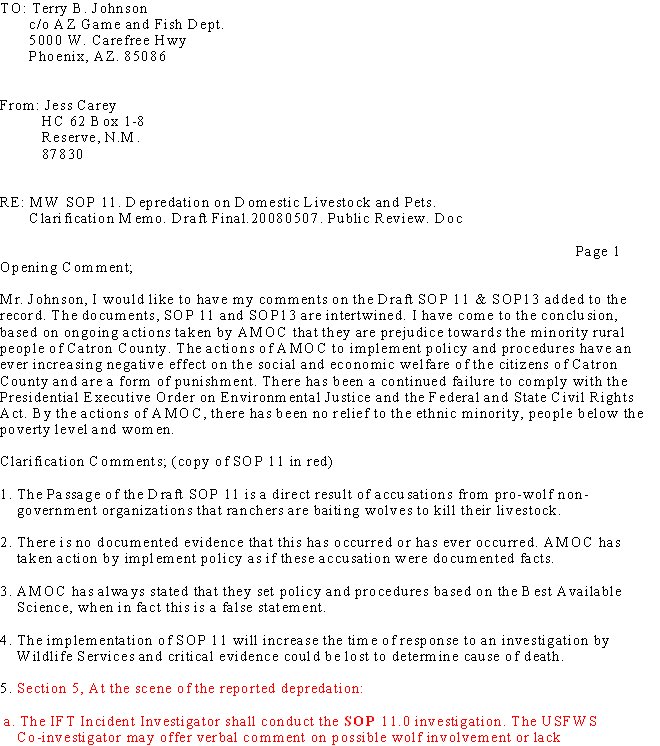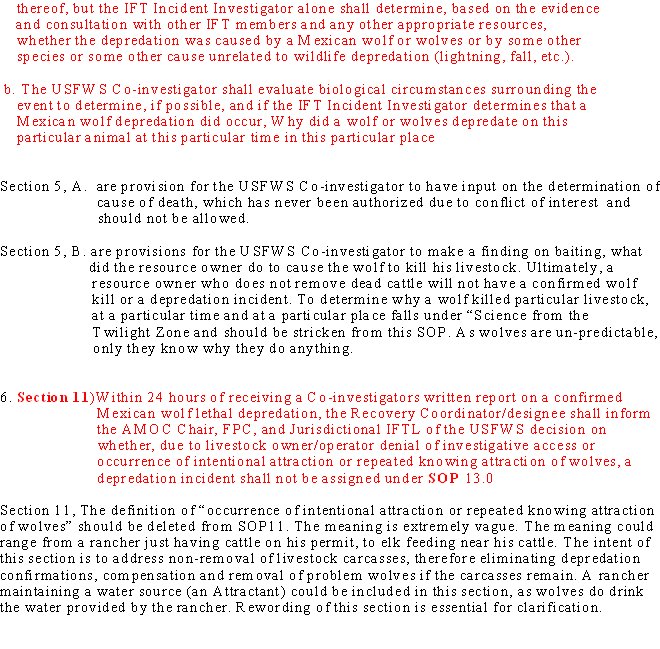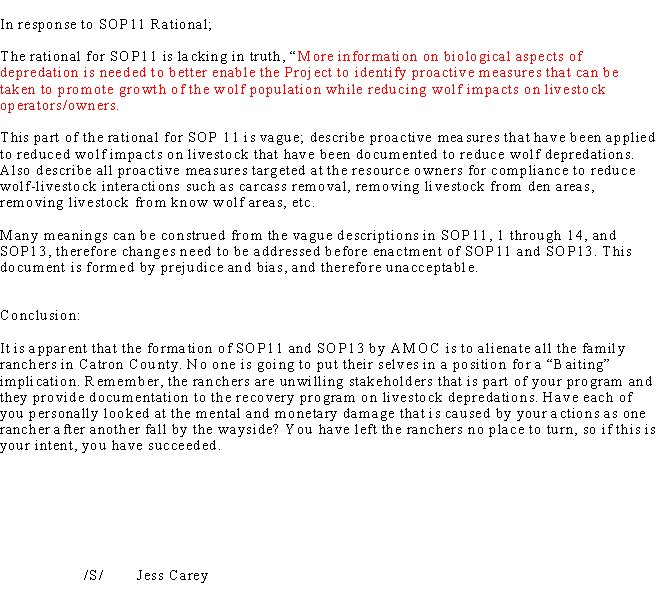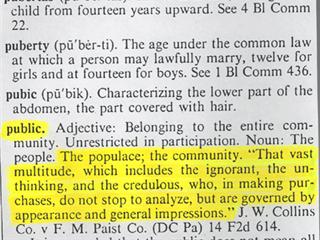Reprinted with permission of Agri-News, editor@imt.net, www.cattleplus.com.
January 9, 2008
Friends of the Northern Yellowstone Elk Herd invite ranchers to fight for wolf delisting
By Tami Arvik Blake, Agri-News editor
Sidebar
WILL RANCHERS UNITE TO FIGHT WOLVES?
If it's going to happen, it has to be before the end of February.
Total cost of a lawsuit to force the federal government to immediately delist wolves will be $200,000.
That's 200 people contributing $1,000 each... 400 people contributing $500 each... you get the idea.
Want more information? Call Friends of the Northern Yellowstone Elk Herd president, Bill Hoppe, at 406.848.7651, or simply send donations to FOTNYEH, 172 Jardine Route, Gardiner MT 59030. Bob Fanning can be reached via email: rtfanning@att.net.
Story Text
It's not too late: ranchers can still take the Rocky Mountain gray wolf to court.
Though the federal government has promised to remove the wolf from the Endangered Species List in February of this year, experts agree that lawsuits brought by environmental groups will likely tie the issue up for some ten years.
That means ten more years of wolf protection - and ranchers, livestock, and wildlife paying the price.
There is one way to avoid that scenario, though. What if somebody can beat the environmentalists to the punch by suing the federal government to immediately delist wolves before the official announcement comes next month?
The groundwork for just that sort of action is already finished.
Of course, there's a certain procedure that must be followed when taking legal action against the Endangered Species Act. Complaints must be filed before deadlines, and as far as wolves are concerned, those deadlines are long past.
The state of Montana does not have legal standing right now to fight for immediate wolf delisting.
But Bob Fanning does, and he's hoping that ranchers will team up with him to remove federal protections from wolves.
Fanning is the founder of Friends of the Northern Yellowstone Elk Herd, a small organization based out of Fanning's home deep in the mountains north of Yellowstone Park. FOTNYEH is the only entity in the states of Montan and Idaho that has legal standing to sue the federal government to delist wolves.
The only thing missing is the money - and the public interest.
Fanning hoped to gain both when state representative Diane Rice (R-Harrison) carried House Bill No. 343, "An Act appropriating money from the General Fund to the Legislative Services Division to fund state participation in a pending lawsuit against the federal government challenging the failure of the federal government to remove wolves from the Endangered Species List," during the 2007 session.
"Since this is the only entity that can litigate on behalf of the people of Montana, I believed that the state of Montana should appropriate money to help them file a lawsuit to encourage delisting," Rice says.
The bill asked for a $200,000 appropriation to pay for the lawsuit. It passed the Montana House by a margin of 63:37 but died in the Democrat-controlled Senate Finance & Claims Committee.
Fanning says that the Governor's Office and Montana Fish, Wildlife & Parks were both in opposition to the bill. "It's a political issue because Fish, Wildlife & Parks wants to maintain control over the whole wolf thing," he says. "They get a tremendous amount of money to implement and administrate their federally-approved/imposed wolf management plan, and they don't want to jeopardize that money."
What FWP fails to realize, Fanning says, is that the wolf money comes at the expense of the state's livestock and hunting industries.
The state and wolves
Serving her fourth term in the Montana legislature, Diane Rice knows a thing or two about livestock. She and her husband are partners in Rice Angus, and she previously served as chair of the House Ag Committee. She is currently chair of the House Judiciary Committee.
Ranching in the Madison Valley northwest of Yellowstone, the Rices have had a few encounters with wolves. A pair of the predators, in fact, terrorized their heifers the night before the ranch's annual production sale in November.
Rice understands the issues because she's rooted in the ag industry. And that's why it's been important for her to take wolf legislation to Helena. In 2003, HR32 - a resolution urging the US Congress to delist wolves - passed the Montana legislature.
That same year, HB283 - directing Montana's Attorney General to explore the state's rights to all wolf-related legal options - also passed. According to Fanning, Attorney General Mike McGrath "defied" that order from the state legislators and never did pursue the issue. That's why the state does not have legal standing today to proceed with wolf litigation.
And in 2005 HJR29 made a strong statement: "... Clarifying to appropriate federal government officials that Montana reserves its applicable rights and remedies to request federal predator control and to exercise rights and remedies to prevent and control damage or conflict on federal, state, or other public or private land caused by predatory animals, and urging the Montana Congressional delegation to take appropriate measures to obtain meaningful funding and assistance for Montana citizens and communities that have been adversely affected by wolf reintroduction."
That resolution passed by a "super majority," Rice says, but has not received much attention in Washington, DC.
Not surprising behavior, Fanning says, from agencies that deceived Congress - which approved the reintroduction of wolves to Yellowstone Park in November of 1994 - into believing that the reintroduction would minimally impact people and wildlife. He says that in 1988 the Department of Interior commissioned a Delphi 15 study that concluded a reintroduced wolf population would grow to 100 animals at the most.
"Their computer model said, if we reintroduce some wolves, in 10 to 20 years we'll get to 70, 80, maybe 100 wolves," Fanning says. "They knew all along that wolf packs reproduce at a 34 percent rate, but they deceived Congress into thinking it would be a little number."
Fanning guesses that there are about 1,600 wolves in Montana alone now. "They stopped counting these wolves years go. They don't want you to know where they are or what they're up to."
Fanning doesn't doubt that the recent public comment period concerning wolf delisting - open to anybody across the nation - garnered a majority response in opposition to delisting. But he believes that's all part of a master plan: "Come February, the US Fish & Wildlife Service will issue an administrative order to delist, in defiance of the emotional popularity contest," he explains. "Then those people who have been allegedly 'harmed' will gain standing to file lawsuit because they've been 'harmed' by the delisting order. They will get to court before anybody else has a chance, and then it will be tied up for years.
"The easiest thing to do in litigation is stall. The longer you stall, the more these wolf populations grow."
That's why it's important, Fanning says, for a lawsuit to be filed before the delisting order, expected February 28.
Simply put, if ranchers and sportsmen don't get their foot in the door soon, it will be too late.
A biological desert
It's the sportsmen side of the equation that Fanning relates to.
He's a Notre Dame graduate who worked on Wall Street for 20 years and later became CEO of his own company. Through the normal course of his business, he says, he learned the ins and outs of the legal system. "So I've got the skills set to be involved in this mess," he says.
He came to Montana to hunt elk for many years and came to stay in 1996, settling on a small acreage 20 miles north of Yellowstone Park. When he first moved in, the Northern Yellowstone elk herd - one of the largest migratory herds in the nation - moved across his land on its way to and from winter grazing.
"I had the chance to see 6,000 or 7,000 elk pass by my house every year. If that was too many, now we see zero."
Today, he calls the landscape around his property "sterilized." By 1998, he says, there were almost no elk in the wilderness around his home. "All you saw was wolf tracks on the game trails, and you don't hear bugles, you don't see rubs, you don't see fresh droppings.
"In years gone by I could ride up to a wolf on the trail," he says. "I've had them run by my house. But now that the game herd is so severely depleted in Yellowstone Park, they're up in the Shields Valley, the places that people never imagined. Southern Park County is a biological desert. Buffalo give the impression that Yellowstone Park is teeming with wildlife. Well, wolves are opportunistic killers, and buffalo are tough characters."
Fanning says at one time it was easy to count elk as they trailed across his property. At one time, he says, there were nearly 20,000 in the Northern Yellowstone herd; now he guesses there are only 5,000 remaining.
Fanning says FWP has refused to recognize the elk population decline. Because predators have driven the elk onto private land and into new areas of the state, the population is more noticeable to the general public. FWP even hosted an extended elk season this year.
But Montana hunters no longer find elk where the animals once were. Rice notes that, because of that, out-of-state hunter numbers for Montana declined by 42% in the period between 1995 and 2005. In-state hunter numbers declined by 21% in the same. That leaves a gaping hole in the state's economy, previously filled by what was over a $230 million industry.
Rice blames increased hunting fees for some of that decline, but a displaced and deteriorating elk herd for a good part of it.
When wolves follow wildlife onto private land, they become acquainted with livestock and habituated to settlements. That's when they acquire a taste for beef and lamb, the meat carried by easy prey.
"And once they get used to seeing people, children are not so difficult to take down," Fanning warns.
A day in court
When he first moved to Montana, "I thought I'd be a hermit in the middle of nowhere," Bob Fanning says. But his frustrations over the declining elk population in his backyard wilderness led to the beginnings of Friends of the Northern Yellowstone Elk Herd, and now he's in the fight perhaps deeper than he'd like to be.
"This isn't about me and I don't ever want it to be about me," he says. "I wish somebody would come and take it away. We passed laws where the state of Montana should have asserted its legal rights and delisted the wolf years ago. But the state didn't, and now this is the only avenue to fight for delisting. Anybody can pay for the attorney fees and file the lawsuit. They just have to go through me, unfortunately, because I'm the only person in the states of Montana and Idaho with legal standing to do so."
Fanning envisions a coalition of ranchers and sportsmen taking this case to force wolf delisting to the highest court in the nation - and winning. "The case is a shoo-in because the reintroduction of wolves was actually illegal. There were wolves in Montana before the reintroduction. And now that they're here, the situation will take care of itself and the damages will stop if we can just delist the animal. The most unnatural thing about the wolf is the fact that it's being protected.
"I neither love or hate wolves," Fanning says. "I just hate bureaucrats that exploit anything for their own advancement. I'll be the first to admit wolves are here to stay. But the protection has to come off the animal so the animal is given the opportunity to learn how to behave around people.
"Here's what the common guy in the state of Montana should ask himself: Why is the little guy systematically denied his day in court over wolves by politicians? As long as I breathe on this planet, I will be willing to take this to the Supreme Court... but I'm not paying the legal bill."
Diane Rice agrees that the case is something every Montanan should consider being a part of. First of all, the people of Montana own the state's wildlife population and have a right to file for wolf-caused damages on the same.
Second of all, wolves kill livestock, and that hurts ranchers' bottom lines. Though ranchers close to the park have taken the brunt of the punishment thus far, she says, the wolves will soon spread all across the state, and into other states, in pursuit of elk and livestock.
Rancher or sportsmen, Fanning envisions both coming together to battle for wolf delisting.
"If you're angry about the buffalo in Yellowstone Park, if you're angry about the way the bully in Helena is treating you, if you're angry that you didn't get an elk this year, or if you're angry that elk have been pushed down on your property by wolves, then I'm offering you the standing to have your day in court," he says. "Consider it a chance to protect your livelihood, culture and heritage."
- Tami Blake, Agri-News editor
Tami Jo Arvik Blake
Agri-News editor
PO Box 30755
Billings, Montana 59107
406.259.5406
Posts and Comments from Readers
Please include yourself in the discussion. Post a comment.
Monday, January 14, 2008
More from Agri-News on Wolves
Labels:
Agri-News,
Bob Fanning,
Hunters,
Montana,
Otero County,
Ranchers,
Wolves
Subscribe to:
Post Comments (Atom)



















.jpg)


















No comments:
Post a Comment